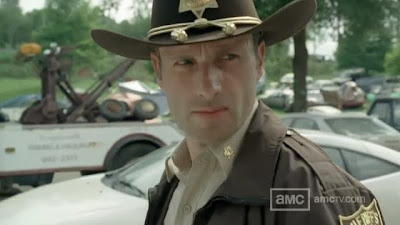Is this an example of what passes for justice in this new society that is forming within the prison walls? Or does justice have nothing to do with it?
I hope you all enjoyed Indifference as much as I did. I’m sure it will be regarded as one of the stronger episodes of the series. But for a few reasons, I decided to break from my usual episode review format this week to instead raise this question for discussion: What passes for justice after a zombie apocalypse?
Carol’s Crime
Carol explains to Rick that she killed Karen and David because their illness would have killed them all. In her eyes, she was “stepping up.” “We needed the bodies gone. We needed to stop it from spreading. They were the only ones who were sick. They were a threat. I was trying to save lives. I had to try. Somebody had to.”Rick tells Carol that once the others learn what she has done, they won’t want her with them, and that he doesn’t want her around his children. Both Rick and Carol in their acts are deciding the fate of others for the good of the group, in their eyes. They're acting as leaders. What’s interesting here is that Rick makes the decision to banish Carol when he is no longer the leader and no one else has had any input. No one had any input on Carol’s decision either, but she was part of the governing council - so she was officially a leader. Does Rick still have the authority to make a decision like that on behalf of the group?
Sheriff Rick
We first met Rick as a highly regarded and even-tempered lawman. He believed in right and wrong. He believed in the system he served. And he was willing to risk his life for his job. Upon waking up in a world that had ended, one of his first actions is to find his uniform and put his sheriff’s hat back on. It isn’t until season 2, when Rick begins to lose faith in his ideals, that he passes his hat on to his son.We were recently reminded of Rick’s former role when Tyreese appealed to Rick to find Karen’s killer. But Tyreese wasn’t looking for justice. He was looking for vengeance. He didn’t tell Rick to find the person and bring him to justice. He told Rick, “You find out who did this and you bring them to me.”
Like Carol, Rick has made decisions to kill – either directly or indirectly – on behalf of the group. He shot Dave and Tony, he killed Shane, and he led an attack on Woodbury to rescue Glenn and Maggie, which led to deaths on both sides. He was ready to execute Randall in season 2 before he realized Carl was there to witness the death. When he turned Tyreese and Sasha out of the prison in season 3, to what appeared to be a death sentence, Tyreese tells him that what happens to them would be on him.
Carol admits that their decisions are always in response to a threat, and are made so that “we” can live. It’s a kill-or-be-killed world, and Carol’s reasoning for killing Karen and David doesn’t sound all that different from Rick’s in seasons past. Her point of view is evident in her instruction to Lizzie: “And if it’s your life, or your sister’s life, you can’t be afraid to kill.”
In fact, Carol calls Rick on the parallels. She compares what she did to Rick killing Shane. Rick responds that Shane was going to kill him, to which she replies, “So were they. They were going to kill all of us.”
Rick hasn’t killed one of their own, though, and is that what it comes down to?
Discussion Questions:
- Can the ideal of justice exist in this world with no societal structure?- What would a system of justice look like in this world? What would the values be that support it?
- Do you think Rick was motived by justice or by something much more personal? Was the reason he didn’t want Carol around that she reminded him of a part of himself – a part of them all – that was changing and that he was trying to repress?
- What do you think will pass for justice when the group eventually meets up with The Governor (assuming they do)?



